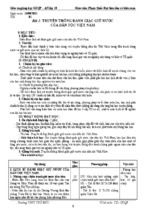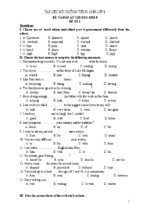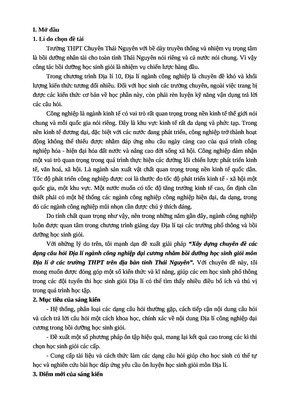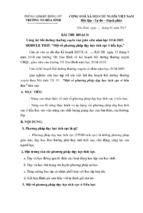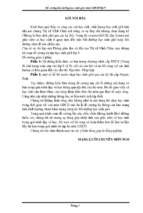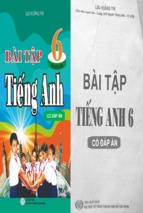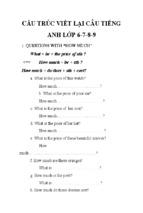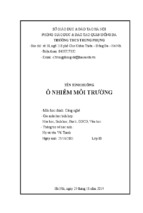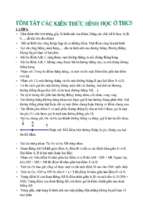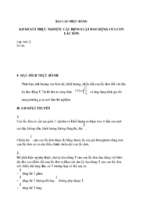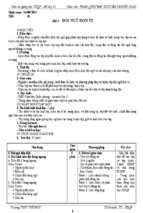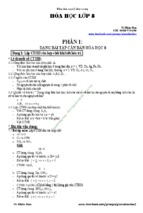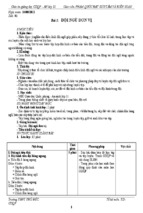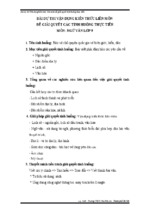Hoàn thành đoạn văn
When you read something in a foreign language, you frequently come across words you do not
fully understand. Sometimes you (1) ______ the meaning in a dictionary and sometimes you
guess. The strategy you adopt depends very much upon the degree of accuracy you require and
the time at your disposal.
If you are the sort of person who tends to turn to the dictionary frequently, it is (2)
______ remembering that every dictionary has its limitations. Each definition is only an
approximation and one builds up an accurate picture of the meaning of a word only after meeting
it in a (3) ______ of contexts. It is also important to recognize the special dangers of dictionaries
that translate from English into your native language and vice versa. If you must use a dictionary,
it is usually far safer to consult an English-English dictionary.
In most exams you are not permitted to use a dictionary. (4) ______ you are allowed to
use one, it is very time-consuming to look up words, and time in exams is usually limited. You
are, therefore, forced to guess the meaning of unfamiliar words. When you come across
unknown words in an exam text, it is very easy to panic. However, if you develop efficient
techniques for guessing the meaning, you will overcome a number of possible problems and help
yourself to understand far more of the text than you at first thought likely.
Two strategies which may help you guess the meaning of a word are: using contextual
clues, both within the sentence and outside, and making use of clues (5) ______ from the
formation of the word
Câu 1: A. control
B. inspect
C. check
D. examine
Câu 2: A. valuable
B. worth
C. essential
D. vital
Câu 3: A. variation
B. multiple
C. diversity
D. variety
Câu 4: A. Even if
B. Provided
C. Although
D. In case
C. derived
D. coming
Câu 5: A. originated B. extracted
Perry had a rough childhood. He was physically and sexually abused growing up, got kicked out
of high school, and tried to commit suicide ___(1)___ once as a preteen and again at 22. At 23 he
move to Atlanta and took ___(2)___ odd jobs as he started working on his stage career.
In 1992 he wrote, produced, and starred in his first theater ___(3)___, I Know I’ve Been
Changed, somewhat informed by his difficult upbringing. Perry put all his savings into the show
and it failed miserably; the run lasted just one weekend and only 30 people came to watch. He
kept up with the production, working more odd jobs and often slept in his car to get by. Six years
later, Perry finally ___(4)___ through when, on its seventh run, the show became a success. He‘s
since gone on to have an extremely successful career ___(5)___ a director, writer, and actor. In
fact, Perry was named Forbes’ highest paid man in the field.
Câu 6: A. up
B. off
C. in
D. to
Câu 7: A. producer
B. productivity
C. production D. productive
Câu 8: A. producer
B. productivity
C. production D. productive
Câu 9: A. went
B. broke
C. got
D. put
Câu 10: A. same
B. as
C. like
D. as soon as
Nowadays people are more aware that wildlife all over the world is in danger. Many species of
animals will become (1)_____ if we do not make an effort to protect them. There are many reasons
for this. In some cases, animals are (2) _____for their fur or for other valuable parts of their bodies.
Some birds, such as parrots, are caught alive and sold as pets. For many animals and birds the
problem is that their habitat - the place where they live - is (3) _____ . More land is used for farms,
for houses or industry, and there are fewer open spaces than there once were. Farmers use powerful
chemicals to help them grow better crops, but these chemicals pollute the environment and (4)
_____ wildlife. The most successful animals on earth - human beings - will soon be the only ones
(5) _____ , unless we can solve this problem.
Câu 11: A. disappeared
Câu 12: A. hunted
B. chased
Câu 13: A. exhausting
Câu 14: A. spoil
B. vanished
C. game
B. departing
B. harm
Câu 15: A. survived B. over
C. empty
D. extinct
D. extinct
C. escaping
D. disappearing
C. wound
D. wrong
C. missing
D. left
I had never been to Denmark before, so when I set out to catch the ferry in early May, I little
suspected that by the end of the trip I'd have made such lasting friendships. Esjberg is a (1)_____
port for acyclist's arrival, where tourist information can be obtained and money changed. A cycle
track leads out of town an down to Ribe, where I spent my first night. The only appointment I
had to (2)_____ was a meeting with a friend who was flying out in June. I wanted to use my time
well, so I had planned a route which would include several small islands and various parts of the
countryside.
In my (3)_____, a person travelling alone sometimes meets with unexpected hospitality,
and this trip was no exception. On only my second day, I got into conversation with a cheerful
man who turned (4)_____ to be the local baker. He insisted that I should join his family for
lunch, and, while we were eating, he contacted his daughter in Odense. Within minutes, he had
arranged for me to visit her and her family. Then I was sent on my way with a fresh loaf of bread
to keep me (5)_____, and the feeling that this would turn out to be a wonderful holiday
Câu 16: A. capable
B. ready
C. favourable D. convenient
Câu 17: A. do B. support
C. keep
Câu 18: A. experience
B. knowledge C. observation D. information
Câu 19: A. up B. out C. in
D. over
Câu 20: A. doing
B. making
D. maintain
C. being
D. going
The application (1)_________ for volunteers for the 15th Asian Games Doha 2006 is now
closed. Organizers have been flooded with interest and have now filled all available roles. Any
further (2)__________will have their details stored on file and will only be contacted in the
event of any vacancies unexpectedly arising.
Over 30,000 men and women, not only from Qatar, but also from the Gulf (3)__________and
even further afield, have volunteered to help out at Doha 2006 after more than two years of
meetings and interviews. First of all, a big “thank you” to everyone for your enthusiasm and
commitment in volunteering to give up some of your precious free time to become part of the
Games of your Life. The (4)______ has been quite overwhelming and has far exceeded
expectations.
“It shows that the Qatar public has embraced the (5)_________of the Games”, says Khaled
Helaly, manager of the Doha 2006 Volunteers Programme
Câu 21: A. growth
B. development
C. process
D. progress
Câu 22: A. applicant B. student
C. competitor D. citizen
Câu 23: A. Corner
C. section
D. region
Câu 24: A. response B. replace
C. repeat
D. rely
Câu 25: A. spirit
C. value
D. position
B. address
B. name
DO SMALLER CLASSES REALLY HELP?
In an experiment in Canada, ten-year-old children were put in classes of four sizes: 16, 23, 30 and
37 children in (31)____ class. Their teachers said that the smaller classes would result in more
individual attention and better marks. However, when the children were (32)____, those in the
smaller classes didn’t get higher marks than the others, except in mathematics. Moreover, children
in the larger classes said they liked school (33)____ as much. Perhaps the most surprising result
was the difference between what teachers expected and the actual results obtained. More than 90%
of the teachers expected the smaller classes to (34)____ well. After teaching these smaller classes,
over 80% of the teachers thought the pupils had done better. However, according to the researchers,
nothing of the (35)____ happened. Class size seemed to make a difference only to the teachers’
own attitudes - and not to the results they obtained. (Source: “Longman Tests in Contexts” by J.B.
Heaton)
Question 26: A. every
B. one
C. each
D. either
Question 27: A. tested
B. experimented
C. taught
D. checked
Question 28: A. only
B. so
C. just
D. also
Question 29: A. make
B. do
C. test
D. obtain
Question 30: A. sort
B. type
C. variety
D. form
In a small village in North Yorkshire, there is a big old farmhouse ______(31) three families live
together. Alice and George and their three children, Joe and Pam and their two children, and Sue
and her baby daughter. The adults divide up the work between them. George does the cooking,
Joe and Sue do almost the housework. Pam looks after the shopping and ______(32) the repairs,
and Alice takes care of the garden.
Alice, George and Sue go out to work. Joe works at home ______(33) computer systems, and
Pam, who is a painter, looks after the baby during the day. Two of the children go to school in
the village, but the three oldest ones go by bus to the secondary school in the nearest town, ten
miles away. [Ph¸ t hµnh bëi dethithpt.com]
The three families get ______(34) well, and enjoy their way of life. There are a few
difficulties, of course. Their biggest worry at the moment is money- one of the cars needs
replacing, and the roof needs some expensive repairs. But this isn't too serious- the bank has
agreed to a loan, which they expect to be able to pay back in three years. And they all say they
would much rather go on living in their old farmhouse ______(35) move to a luxury flat in a big
city.
Question 31: A. that
B. where
C. in where
D. which
Question 32: A. does
B. makes
C. prepares
D. fulfils
Question 33: A. designs B. and design
C. designing
D. who designs
Question 34: A. on
B. off
C. with
D. in
Question 35: A. then
B. than
C. to
D. therefore
Left- handers are the odd ones out. Sure, lefties________ (31) up about 10 percent of the
population, but, frankly, it seems like society has forgotten about them. Just consider all of the
right-handed gadgets, awkwardly designed desks, and cooking tools that fit comfortably only in
your right hand. What________(32) someone to become a southpaw? Scientists aren’t exactly
sure, but research points to a complex________(33) between genes and environment. While no
exact set of “leftie genes” have been discovered, people who dominantly use their left hands do
have more left-handed family members. And researchers have found different brain wirings in
righties vs. lefties. But no matter ________(34) it is that drives someone to use their antipodal
paw, science has also uncovered a particular set of personality traits that left-handed people tend
to have. So for all of you lefties, leftie- loving righties, and ambidextrous folks out there - it’s
time to brush up on your left-handed knowledge and help ________(35) an end to leftie
discrimination once and for all
Question 36: A. consist B. account
C. hold
D. make
Question 37: A. causes
C. gets
D. does
Question 38: A. collaborate B. collaboration
C. collaborating
D. collaborated
Question 39: A. which
C. what
D. that
B. makes
B. who
Question 40: A. put B. bring
C. make
D. take
Throughout the world, there are many different ways for people (31)_____ each other. In much
of the world, a handshake is the common form of welcoming and greeting someone. In many
countries around the Mediterranean Sea a (32)_____ kiss on the cheek is the appropriate way to
welcome friends and family. It can be a very big surprise if you expect to shakes hands and get a
kiss or a hug (33)_____.
At times, it is difficult to tell (34)_____ sort of greeting custom is followed. People may bow,
grab another's arm or even slap the other person on the back. In some places, people just smile,
look at the other's face and say nothing. [Ph¸ t hµnh bëi dethithpt.com]
Most people in the world are (35)_____ of visitors and don't mind what travellers do that
seems experiencing different customs."
Question 41. A. to say
B. to tell
C. to greet
D. to talk
Question 42. A. light
B. fast
C. heavy
D. superficial
Question 43. A. though
B. but
C. even
D. instead
Question 44. A. who
B. which
C. where
D. what
C. selfish
D. generous
Question 45. A. tolerant B. independent
Most educational specialists believe that early schooling should provide children with an (31)
________ of their own abilities and the self-confidence to use their abilities. One approach
recognized by many (32) ________ as promoting these qualities is the Montessori method, first
practiced by Maria Montessori of Italy in the early 1900s. Nancy McCormick Rambusch is
credited with (33) ________ the method in the United States, where today there are over 400
Montessori schools. [Ph¸ t hµnh bëi dethithpt.com]
The method helps children learn for themselves by (34) ________ them with instructional
materials and tasks that facilitate acts of discovery and manipulation. Through such exploration,
children develop their sense of touch and learn (35) ________ to do everyday tasks without adult
assistance. Other benefits include improvement in language skills, and acquaintance with
elements of science, music, and art.
Question 46. A. awareness B. attitude
C. attention
D. knowledge
Question 47. A. researcher B. teacher
C. tutors
D. experts
Question 48. A. popular B. popularity
C. popularize
D. popularizing
Question 49. A. giving
B. instructing
C. sending
D. providing
Question 50. A. how
B. what
C. that
D. which
About 50 or so kinds modern plastic are made from oil, gas, or coal-non-renewable natural
resources . We (15) _______ well over three million tons of the stuff in Japan each year and,
sooner or later, most of it is thrown away. A high proportion of our annual consumption is in the
(16) _______ of packaging and this constitutes about seven percent by weight, of our domestic
(17) _______. Almost all of it can be recycled, but very little of it is, though the plastic recycling
industry is growing fast. The plastics themselves are extremely energy - rich – they have a higher
calorific (18) _______ than coal and one method of “recovery” strongly (19) _______ by plastic
manufactures is the conversion of waste plastic into a fuel.
Question 51. A. consign B. import
C. consume
D. remove
Question 52. A. form
B. way
C. type
D. kind
Question 53. A. goods
B. refuse
C. rubble
D. requirements
Question 54. A. effect
B. degree
C. value
D. demand
Question 55. A. argued
B. presented
C. desired
D. favored
ABROAD WITH US
The company study abroad was originally founded in 1991 for students who wished to study
French in France. Its success led to the establishment of other schools around the world.
Learning the language in the country in which it is spoken is, of course, a (29) __________
more effective and faster process than studying in your own country. It is also an opportunities to
mix with local habitants and (30) __________ a greater and deeper (31) __________ of the
people whose language you are studying. This makes the whole experience much more
enjoyable.
You may wish to attend an Italian language and a cooking course in Italy or combine a
Portuguese course with a sport. You should look at all the possibilities and (32) __________ the
best choice. In order to choose the (33) __________ course and location for you, we suggest you
contact us to discuss your particular requirements. From the information you give us, we can
make some recommendation.
Question 56. A. lots
B. so
C. very
D. far
Question 57. A. acquire B. require
C. enquire
D. inquire
Question 58. A. knowledge B. knowledgeable
C. knowledgeably
D. know
Question 59. A. do
B. take
C. get
D. make
Question 60. A. exact
B. right
C. precise
D. fit
BRINGING THE LEARNING OUTDOORS
Kindergarten is a fun place (1) ________ young children learn. In some special kindergartens,
children learn outside most of the day!
Some kindergartens are (2) ________ the forest. In these "forest kindergartens," children play
freely. They're outside in all kinds of weather. At forest kindergartens, children learn by climbing
trees and picking fruit. They also learn about and (3) ________ animals. For example, they collect
chicken eggs and feed baby mice.
Little Flower Kindergarten is in Dong Nai, Vietnam. At this school, children learn about farming.
They also learn that it is important (4) ________ healthy food. They grow vegetables in gardens - on
the roof! They eat the vegetables they grow in their lunches.
At Fuji Kindergarten in Tokyo, Japan, trees grow inside the building! The classroom windows
and sliding doors (5) ________ open to the outside most of the year. The roof is a big, wooden
circle. Children love to play and run on it.
Câu 61: A. why
B. when
C. where
D. which
Câu 62: A. at
B. in
C. on
D. by
Câu 63: A. take care of
B. take over
C. take on
D. take after
Câu 64: A. to eat
B. eating
C. ate
D. eaten
Câu 65: A. make
B. stay
C. do
D. be
As teenagers approach university level, a decision has to be made on what course to pursue. In
this world of diversity, (1) ______ such a choice is not easy for both children and parents. In the
old days, it was not much a problem to do the task because there were not so many diverse
learning areas to choose from. Besides, there were only a few distinctive professional careers like
doctor, engineer, accountant, nurse, teacher,etc. to think about. Most higher learning usually led
to a financially successful life. (2) ______, the cost of education was not so high. Today’s world
is entirely different from the things (3) ______ have just been described. The job market is
constantly changing due to innovative technology and new (4) ______. Meanwhile, most
teenagers have difficulty in identifying their own interests. There are a variety of well- organized
career talks and student counseling workshop to guide and help teenagers (5) ______ what
course to take. Furthermore, psychological tests are also used. Certain instruments such as
surveys, interviews and computer software can help to find out preferences, interests, or learning
styles of the students.
Câu 66: A. taking
B. making
Câu 67: A. In addition
C. giving
D. having
B. Otherwise C. For example
C. where
D. Therefore
Câu 68: A. when
B. that
Câu 69: A. competitively
B. competition C. compete
D. competitive
Câu 70: A. employ
B. study
D. apply
C. decide
D. what
Swim, Cycle, and Run
For athletes who like to (1)______a variety of endurance sports in a single race, triathlons are a
great fit. These competitions (2) ______running, cycling, and swimming into one race, and they take
place one after the other in a single continuous timed race. Athletes who participate must be in top
physical form and have the skills needed to complete each portion of the race.
Training for triathlons means the athletes have to become proficient not only in the sport required
in each stage, but they also have to become familiar with what (3) ______from one to the other does
to their bodies. Many inexperienced triathletes are surprised to (4) ______hard it can be to switch
from swimming to cycling to running, and how tired their muscles can suddenly feel. One thing all
triathletes can agree (5) ______is that no one ever told them that running a triathlon would be easy
Câu 71: A. compete
B. compete in
C. contest
D. take part
Câu 72: A. combine
B. join
C. fasten
D. connect
Câu 73: A. transference B. transition
C. transmission
D. transport
Câu 74: A. find what
B. find out why
C. find out how
D. find how
Câu 75: A. in
B. with
C. at
D. on
Chess, often (1 )______ to as a Royal Game, is the oldest of all board games which do not contain
an element of chance.
The origins of chess are uncertain, (2) ______ there are a number of legends regarding its
invention. One story says that it was King Solomon who invented chess, another that it was the
Greeks god Hermes, and yet another that the Chinese mandarin Han-Sing was responsible for its
creation. In fact, chess almost certainly originated in India in the sixth or seventh century AD. The
game’s popularity then spread quickly through Persia (now known as Iran) and from there came to
Europe. The first documented reference to chess in literature is in a Persia romance which was
written about 600 AD.
It is (3)______ the word ‘chess’ comes from ‘shah’, the Persian word for ‘King’ and that
‘checkmate’, the game’s winning (4)______, comes from the phrase ‘shah mat’, (5)______ ‘the king
is dead’.
The rule and pieces used in the game have undergone changes over the centuries. Modern chess
owes much to the Spaniard Lopez de Sagura, who in 1561 wrote the first book on how to play the
game. In it, he introduced the concept of ‘castling’, which has not been part of the game until then.
Câu 76: A. mentioned
B. called
C. known
D. referred
Câu 77: A. despite
B. nevertheless
C. although
D. however
Câu 78: A. believed
B. imagined
C. held
D. taken
Câu 79: A. place
B. stand
C. go
D. move
Câu 80: A. representing
B. suggesting
C. intending
D. meaning
My first job was a sales assistant at a large department store. I wanted to work part-time, because
I was still studying at university and I was only able to work a few nights a week.
I came across the advertisement in the local newspaper. I remember the interview as
though it were yesterday. The (1) ______ manager sat behind a large desk. He asked me various
questions which surprised me because all I wanted was to work in sales. An hours later, I was
told that I had got the job and was given a contract to go over. I was to be trained for ten days
before I took my post. Also, as a member of staff, I was (2) ______ to some benefits, including
discounts.
When I eventually started, I was responsible (3) ______ the toy section. I really enjoyed
it there and I loved demonstrating the different toys. I was surprised at how friendly my
colleagues were, too. They made working there fun even when we had to deal with customers (4)
______ got on our nerves. (5) ______, working there was a great experience which I will never
forget.
Câu 81: A. personal
B. personable C. personage D. personnel
Câu 82: A. catered
B. given
C. entitled
D. supplied
Câu 83: A. for
B. with
C. in
D. to
Câu 84: A. which
B. why
C. when
D. who
Câu 85: A. In contrast
B. However
C. Moreover D. On the whole
Why is it that many teenagers have the energy to play computer games until late at night but
can’t find the energy to get out of bed (39) _________ for school? According to a new report,
today’s generation of children are in danger of getting so (40) _________ sleep that they are
putting their mental and physical health at (41) _________ . Adults can easily survive on seven
to eight hours’ sleep a night, (42) _________ teenagers require nine or ten hours. According to
medical experts, one in five youngsters (43) _________ anything between two and five hours’
sleep a night less than their parents did at their age.
Question 86. A. behind time B. about time
C. in time
D. at time
Question 87. A. few
C. much
D. little
Question 88. A. jeopardy B. threat
C. risk
D. danger
Question 89. A. or
B. because
C. whereas
D. so
Question 90. A. puts
B. gets
C. brings
D. makes
B. less
Some people return to college as mature students and take full- or part-time training courses in a
skill will help them to get a job. The development of open learning, (25)______ it possible to
study when it is convenient for the students, has increased the opportunities available (26)______
many people. This type of study was formerly restricted to book-based learning and (27)______
course but now includes courses on TV, CD-ROM or the Internet, and self-access courses at
language or computer centers. Americans believe that education is important at all stages of life
and should not stop (28) ______ people get their first job. About 40% of adults take part in some
kind of education. About half of them are trying to get qualifications and skills to help them with
their jobs while the (29)______ are taking recreational subjects for personal satisfaction. Schools
and community colleges arrange evening classes, and a catalog of courses is published by local
boards of education.
Question 91. A. making B. finding
C. keeping
D. enabling
Question 92. A. to
C. about
D. with
B. by
Question 93. A. correspondent B. corresponded C. correspondence
D. corresponding
Question 94. A. whereas B. when
D. otherwise
Question 95. A. remains
C. that
B. rest C. left D. excess
A rainbow is an optical display of color that usually appears in the sky when a beam of sunlight
refracts through millions of raindrops. Each (31) ______ color from the spectrum is then sent to
your eyes. For this to happen, the angle between the ray of light, the raindrop and the human eye
must be between 40 and 42 degrees.
After studying rainbows in (32) ______, Sir Isaac Newton was able to explain how they are
formed. However, he was color blind, so he had to rely on the eyes of his assistant, who could
easily (33) ______ all the seven colors: red, orange, yellow, green, blue, indigo and violet. His
assistant could also clearly tell the difference between indigo and violet.
There are two types of rainbows. Primary rainbows are the most common and have the most
distinctive colors, with red appearing on the outside of the arc and violet on the inside.
Secondary rainbows are unusual because the light is reflected twice within the raindrop before it
(34) ______ a rainbow, so the colors are in reverse order and not as bright as primary rainbows.
There is a popular myth that if you reach the end of a rainbow, you will find a pot of gold
waiting for you. In fact, it is impossible to do this, because a rainbow has no end - as you go
towards the point where the rainbow seems to touch the ground, it moves away from you as
quickly as you (35) ______.
Question 96: A. single
B. divided
C. detached
D. separate
Question 97: A. depth
B. width
C. breadth
D. length
Question 98: A. realize
B. discover
C. understand
D. recognize
Question 99: A. forms
B. grows
C. develops
D. shapes
B. arrive
C. get
Question 100: A. progress
D. approach
Câu 1: Đáp án C
Control: điều khiển, inspect: thanh tra , check: kiểm tra, examine: xem xét.
Sometimes you (1) ______ the meaning in a dictionary and sometimes you guess.
[thỉnh thoảng bạn tra nghĩa trong một từ điển, và đôi khi bạn đoán.]
Câu 2: Đáp án B
It is worth+ V_ing: đáng để làm gì
If you are the sort of person who tends to turn to the dictionary frequently, it is (2) ______
remembering that every dictionary has its limitations.
[Nếu bạn là kiểu người có xu hướng mở từ điển thường xuyên, nó rất quan trọng để nhớ rằng
mỗi từ điển có hạn chế riêng của nó.]
Câu 3: Đáp án D
Variety: khác nhau
Each definition is only an approximation and one builds up an accurate picture of the meaningof
a word only after meeting it in a (3) ______ of contexts.
[Mỗi định nghĩa là 1 sự gần đúng và một nghĩa để xây dựng hình ảnh chính xác nghĩa của một từ
sau khi gặp trong nhiều trường hợp khác nhau.]
Câu 4: Đáp án A
Even if: thậm chí
In most exams you are not permitted to use a dictionary. (4) ______ you are allowed to use one,
it is very time-consuming to look up words, and time in exams is usually limited.
[Trong hầu hết các kỳ thi bạn không được phép sử dụng từ điển. Ngay cả khi bạn được phép
sửdụng, nó rất tốn thời gian để tìm kiếm từ, và thời gian trong các kỳ thi thường là hạn chế.]
Câu 5: Đáp án C
Derive from: bắt nguồn từ
Two strategies which may help you guess the meaning of a word are: using contextual clues,
both within the sentence and outside, and making use of clues (5) ______ from the formation of
the word.
[Hai chiến lược có thể giúp bạn đoán ý nghĩa của một từ là: sử dụng theo ngữ cảnh các manhmối,
cả trong và bên ngoài câu, và làm cho việc sử dụng đầu mối bắt nguồn từ sự hình thành của từ.]
Câu 6: Đáp án A
Perry had a rough childhood. He was physically and sexually abused growing up, got kicked out
of high school, and tried to commit suicide ___(1)_____once as a preteen and again at 22.
=> Perry có thờ thơ ấu khó khăn. Ông ấy bị chế giễu về phát triền thể hình và giới tính, bị đuổi
học và cố gắng tự tử 2 lần, 1 lần trước tuổi 13 và một lần lúc 22 tuổi.
Câu 7: Đáp án C
Giải thích: A. Producer: nhà sản xuất
B. Productivity: năng suất
C. Production: việc sản xuất
D. Productive: năng suất cao
Dich: In 1992 he wrote, produced, and starred in his first theater ___(3)___,
=> Năm 1992 ông ấy viết, sản xuất và nổi tiếng với tác phẩm sản xuất phim đầu tiên.
Câu 8: Đáp án C
Giải thích: A. Producer: nhà sản xuất
B. Productivity: năng suất
C. Production: việc sản xuất
D. Productive: năng suất cao
Dich: In 1992 he wrote, produced, and starred in his first theater ___(3)___,
=> Năm 1992 ông ấy viết, sản xuất và nổi tiếng với tác phẩm sản xuất phim đầu tiên.
Câu 9: Đáp án B
A. Go through: đi xuyên qua
B. Break through: đột phá
C. Go through: hiểu rõ
D. Put through: tiếp tục (hoàn thành công việc)
Dich: Six years later, Perry finally ___(4)___ through when, on its seventh run, the show became
a success. => 6 năm sau đó, Perry cuối cùng đã có bước đột phá khi trong lần sản xuất thứ 7,
màn trình diễn đã thành công.
Câu 10: Đáp án B
Giải thích:
A. Same: giống như
B. As: như là
C. Like: giống
D. As soon as: ngay khi
Dich: He‘s since gone on to have an extremely successful career ___(5)___ a director, writer,
and actor.
=> Kể từ đó sự nghiệp của ông thành công như là 1 đạo diễn, nhà văn và diễn viên.
Mọi người ngày nay ý thức được hơn động vật hoang dã khắp nơi trên thế giới đang gặp nguy
hiểm. Nhiều loài động vật sẽ trở nên tuyệt chủng nếu chúng ta không cố gắng bảo vệ chúng. Có
nhiều lý do cho vấn đề này. Trong vài trường hợp, động vật được săn lùng bởi lông của chúng
hoặc cho khác bộ phận quý giá trên cơ thể chúng. Một số chim, như con vẹt, bị bắt sống và bán
như thú cưng. Đối với nhiều động vật và chim, vấn đề ở chỗ môi trường của chúng - nơi chúng
sống - biến mất. Đất hơn được dùng cho nông trại, cho nhà hoặc công nghiệp, và có ít khoảng
trống mở hơn lúc trước. Nông dân sử dụng hoá chất mạnh để giúp phát triển mùa màng tốt hơn,
nhưng hoá chất này làm ô nhiễm môi trường và làm hại động vật hoang dã hại. Thành công nhất
động vật trên trái đất - con người - sẽ sớm là người duy nhất còn lại, trừ phi chúng ta có thể giải
quyết vấn đề này.
Câu 11: (1) Đáp án D
Giải thích: Ở dòng đầu tiên có chữ “in danger” (đang gặp nguy hiểm) và “if we do not make an
effort to protect them” (nếu chúng ta không nỗ lực để bảo vệ chúng) => chúng bị tuyệt chủng.
A. biến mất (PII)
B. biến mất (PII)
C. trống rỗng (adj)
D. tuyệt chủng (adj)
Câu 12: (2) Đáp án A
Giải thích: sau ô trống có chữ “for”, kết hợp dịch nghĩa “for fur/other parts” (để lấy lông/lấy các
bộ phận khác)
A. be hunted for: bị săn bắn vì cái gì
B. be chased for: bị theo đuổi vì cái gì
C. game: trò chơi
D. extinct: tuyệt chủng
Câu 13: (3) Đáp án D
Giải thích: xét về nghĩa (môi trường sống đang dần biến mất)
A. kiệt sức
B. rời khỏi, ra đi
C. trốn thoát
D. biến mất
Câu 14: (4) Đáp án B
Giải thích: xét về nghĩa (có hại cho môi trường)
A. làm cho hư hỏng
B. làm hại
C. bị thương, đau
D. Sai lầm
Câu 15: (5) Đáp án D
Giải thích: ở đây cần rút gọn dạng bị động của mệnh đề quan hệ.
A. sống sót (PII) => tuy nhiên “survive” ít khi dùng nghĩa bị động
B. đã qua (adv)
C. biến mất, bỏ lỡ (V-ing)
D. còn lại (PII)
DỊCH BÀI
Tôi chưa bao giờ đến Đan Mạch trước đây, vì thế tôi bắt đầu bắt phà vào đầu tháng năm,
Tôi không nghĩ vào cuối chuyến đi, tôi đã có một tình bằng hữu lâu dài như vậy. Esjberg là cảng
tiện lợi cho đến nơi của du khách, nơi quầy thông tin du lịch có thể đạt được và tiền được đổi.
Đường đi dẫn tôi đi khỏi thành phố xuống đến Ribe, nơi tôi dùng đêm đầu tiên của tôi. Tôi đến
cuộc hẹn với người bạn sắp bay vào tháng sáu. Tôi muốn sử dụng thời gian của tôi thật tốt, vì thế
tôi đã lập kế hoạch rằng tuyến đường sẽ bao gồm vài đảo nhỏ và một loạt các bộ phận của quê.
Theo kinh nghiệm của tôi, du lịch người một mình đôi khi gặp lòng hiếu khách bất ngờ,
và chuyến đi này đâu phải là một ngoại lệ. Trong ngày thứ hai của tôi, tôi đã vào nói chuyện với
vui vẻ người hoá ra lại là người bán bánh mì ở địa phương. Anh ấy nhấn mạnh rằng tôi nên gia
nhập gia đình của anh ấy để ăn trưa, và, trong khi chúng tôi đang ăn, anh ấy liên lạc con gái anh
ấy ở Odense. Trong vài phút, anh ấy đã săp xếp cho tôi thăm cô ấy và gia đình của cô ấy. Tôi sau
đó được gởi đi trên đường đi với ổ bánh mì mới ra lò để làm tôi sống tiếp, và cảm giác điều này
hoá ra lại là ngày lễ tuyệt vời
Câu 16: Đáp án D
Giải thích: Convenient = thuận tiện. => lấy thông tin du khách và đổi tiền
Câu 17: Đáp án C
Giải thích: keep an appointment = đi đến cuộc hẹn mà bạn đã sắp xếp, đặt lịch trước
Câu 18: Đáp án A
Giải thích: “In my experience” = theo kinh nghiệm của tôi
Câu 19: Đáp án B
Giải thích: “turn out to V” : hóa ra là
Câu 20: Đáp án D
Giải thích: “Then I was sent on my way....” => đang trên đường đi thì được gửi ổ bánh mì =>
tiếp tục đi tiếp “going”
Câu 21: Đáp án C
Giải thích: the application process: quá trình ứng tuyển
A. growth (n): sự tăng trưởng, phát sinh
B. development (n): sự phát triển
C. process (n): quá trình
D. progress (n): sự tiến bộ
Câu 22: Đáp án A
Giải thích:
A. applicant (n): người ứng tuyển
B. student (n): sinh viên
C. competitor (n): thí sinh dự thi
D. citizen (n): công dân
Câu 23: Đáp án D
Giải thích:
A. Corner: góc
B. address: địa chỉ
C. section: khu, ngành
D. region: khu vực
Câu 24: Đáp án A
Giải thích:
A. respone (n/v): sự phản ứng/ người hưởng ứng
B. replace (v): thay thế
C. repeat (v): lặp lại
D. rely (n): tin tưởng, dựa vào
Câu 25: Đáp án A
Giải thích:
A. spirit: tinh thần
B. name: danh tiếng
C. value: giá trị
D. position: vị trị
DỊCH BÀI
Việc tuyển tình nguyện viên cho Asian Games Doha lần thứ 5 vào năm 2006 đã khép lại. Ban tổ
chức nhận được rất nhiều sự quan tâm và đã có đủ người cho các vị trí. Ứng viên nào được thêm
vào sẽ có dữ liệu của họ được lưu trữ trên tập tin và sẽ chỉ được liên hệ trong trường hợp có chỗ
trống nào bất ngờ phát sinh.
Hơn 30,000 nam nữ, không những từ Qatar, mà còn từ vùng Vịnh thậm chí xa hơn, đã tình
nguyện để giúp đỡ tại Doha 2006 sau hơn hai năm của cuộc họp và phỏng vấn. Trước tiên, rất
cảm ơn bạn mọi người vì đã nhiệt tình và hết mình trong vai trò tình nguyện, từ bỏ khoảng thời
gian rảnh rỗi quý báu của bạn để trở thành một phần của “Games of your Life”. Hiệu ứng đã
hoàn toàn lấn át và đã vượt xa mong đợi.
"Nó cho thấy rằng công chúng Qatar nắm chặt tinh thần của Asian Games", Khaled Helaly - nhà
quản lý tình nguyện viên của chương trình Doha 2006 nói.
DỊCH BÀI
Những lớp học nhỏ hơn có thực sự có ích?
Trong một thí nghiệm tại Canada, những đứa trẻ 10 tuổi được xếp vào bốn loại lớp: 16, 23, 30 và
37 học sinh mỗi lớp. Giáo viên của chúng nói rằng các lớp học ít hơn sẽ đến đến việc học sinh
chú ý nghe hơn và điểm sẽ cao hơn. Tuy nhiên, khi bọn trẻ được làm bài kiểm tra, những đứa trẻ
ở các lớp nhỏ lại có điểm số không cao hơn lớp còn lại, trừ môn toán. Thêm vào đó, học sinh ở
những lớp lớn hơn nói rằng chúng rất thích đến trường.
Có lẽ kết quả đáng ngạc nhiên nhất là sự khác biệt giữa những gì mà giáo viên mong đợi và thực
tế thu được. Hơn 90% giáo viên mong đợi những lớp ít hơn sẽ làm tốt hơn.
Sau khi dạy các lớp nhỏ hơn, hơn 80% nghĩ rằng học sinh đã làm tố hơn. Tuy nhiên, theo kết quả
nghiên cứu, khong có gì giống như mong đợi cả. Quy mô lớn nhỏ của các lớp học dường như chỉ
để tạo nên sự khác biệt trong cách nhìn nhận của giáo viên - chứ không phải là trong kết quả mà
họ thu được.
Câu 26: Đáp án C
Giải thích: Khi diễn tả mỗi thứ trong một tổng thể nhỏ nào đấy, người ta dùng “each” chứ không
dùng “every”. “Every” dùng để chỉ tất cả từng thứ tương tự nhau trong một tổng thế.
Câu 27: Đáp án A
Giải thích: Vì vế sau nói về việc “điểm không cao hơn” nên vế này phải dùng “tested” với nghĩa
là được làm bài kiểm tra.
Câu 28: Đáp án C
Giải thích: “As much = the same”
Dùng “just” miêu tả ý là học sinh ở các lớp lớn hơn cũng chỉ thích đến trường giống như ở
những lớp nhỏ hơn mà thôi.
Câu 29: Đáp án B
Giải thích: “do” và “make” là hai cặp động từ thường xất hiện chung trong các đáp án. “Make”
với nghĩa là tạo ra cái gì đó. “Do” có nghĩa là làm việc gì.
Câu 30: Đáp án A
Giải thích: “Nothing ở the kind/sort” dùng để nhấn mạnh rằng hoàn cảnh xảy ra khác hoàn toàn
với những gì đã nói.
DỊCH NGHĨA
Trong một ngôi làng nhỏ ở North Yorkshire, có một trang trại cũ nhưng rộng lớn, nơi ba gia đình
sống với nhau. Alice và George và ba đứa con của họ, Joe và Pam và hai đứa con của họ, và Sue
và cô con gái bé bỏng của cô ấy. Những người lớn chia nhau công việc. George nấu ăn, Joe và
Sue làm hầu hết các công việc nhà. Pam phụ trách việc mua sắm và sửa chữa, và Alice chăm sóc
vườn.
Alice, George và Sue đi làm. Joe ở nhà làm thiết kế hệ thống máy tính, và Pam, người là hoạ sĩ,
trông coi em bé vào ban ngày. Hai trong số trẻ em đến học ở ngôi trường trong làng, nhưng ba
đứa trẻ lớn hơn đi bằng xe buýt đến trường trung học ở thị trấn, cách đó mười dặm.
Ba gia đình sống hoà thuận, và thích lối sống của họ. Có vài khó khăn, dĩ nhiên. Mối lo lắng lớn
nhất của họ lúc này là tiền - một trong những chiếc xe hơi cần được sửa chữa, và mái cần một số
sự sửa chữa mắc tiền. Nhưng đây không phải là quá nghiêm trọng - ngân hàng đã đồng ý khoản
vay, cái mà họ mong có thể trả trong ba năm. Và tất cả bọn họ đều nói họ thà tiếp tục sống ở trại
cũ của họ còn hơn là chuyển đến căn hộ sang trọng trong thành phố lớn.
Câu 31: Đáp án A
Giải thích: where thay cho cụm danh từ chỉ địa điểm phía trước “a big old farmhouse”, đằng sau
còn là một mệnh đề hoàn chỉnh “three families live together”.
Câu 32: Đáp án A
Giải thích: do the repairs: làm/đảm nhận công việc sửa chữa
Câu 33: Đáp án C
Giải thích: rút gọn mệnh đề quan hệ dạng chủ động
Câu 34: Đáp án A
Giải thích: get on with: hòa hợp với ai
Câu 35: Đáp án B
Giải thích: would rather V than V: thích cái gì hơn cái gì
DỊCH NGHĨA
Người ra ước tính rằng hơn 99 phần trăm tất cả các loài từng tồn tại đã bị tuyệt chủng. Điều gì
gây ra sự tuyệt chủng? Khi một loài không còn thích nghi với môi trường đã thay đổi, nó có thể
biến mất. Các nguyên nhân chính dẫn đến một loài chết đi khác nhau đối với các trường hợp
khác nhau. Sự thay đổi hệ sinh thái quá nhanh có thể khiến môi trường sống trở nên khó khăn
với các loài đó. Ví dụ, nhiệt độ có thể thay đổi mà một loài không thể thích nghi. Nguồn thức ăn
có thể bị ảnh hưởng bởi những thay đổi của môi trường, sau đó sẽ tiếp tục gây ra những vấn đề
khác cho loài mà cần sử dụng nguồn thức ăn này. Các loài khác có thể thích nghi tốt hơn với môi
trường, dẫn đến sự cạnh tranh và cuối cùng là cái chết của một loài nào đó.
Các mẫu hóa thạch cho thấy rằng sự tuyệt chủng đã xảy ra trong suốt lịch sử của trái đất. Phân
tích gần đây cũng tiết lộ rằng trong một số trường hợp nhiều loài đã tuyệt chủng cùng một lúc tuyệt chủng hàng loạt. Một trong những ví dụ nổi bật của tuyệt chủng hàng loạt xảy ra vào 65
triệu năm trước đây với sự sụp đổ của khủng long và nhiều sinh vật khác. Có lẽ lần tuyệt chủng
hàng loạt lớn nhất xảy ra vào 225 triệu năm trước đây, khi khoảng 95 phần trăm số loài đã chết.
Tuyệt chủng hàng loạt có thể bị gây ra bởi sự thay đổi tương đối nhanh chóng của môi trường và
có thể trở nên tồi tệ hơn bởi các mối liên hệ mật thiết giữa các loài. Ví dụ, nếu một điều gì đó đã
xảy ra và tiêu diệt nhiều sinh vật phù du trong các đại dương, sau đó hàm lượng oxy của trái đất
sẽ giảm, thậm chí ảnh hưởng đến các sinh vật không sống trong đại dương. Một sự thay đổi như
vậy có thể sẽ dẫn đến sự tuyệt chủng hàng loạt.
Một khám phá thú vị, và cũng gây ra nhiều tranh cãi, đó là sự tuyệt chủng trong suốt 250 triệu
năm qua đã có xu hướng tăng mạnh mẽ hơn su mỗi 26 triệu năm. Sự tuyệt chủng có chu kì này
có thể là do giao điểm của quỹ đạo trái đất với một đám mây sao chổi, nhưng thuyết này hoàn
toàn chỉ là suy đoán. Một số nhà nghiên cứu cũng đã cho rằng sự tuyệt chủng thường là ngẫu
nhiên. Nghĩa là một số loài bị loại bỏ và những loài khác có thể tiếp tục tồn tại mà không có lí do
cụ thể nào. Sự tồn tại của một số loài có thể không liên quan gì đến khả năng thích nghi hay
không thích nghi của chúng. Nếu vậy, một vài sự tiến hóa lịch sử có thể phản ảnh một chuỗi các
sự kiện ngẫu nhiên quan trọng.
DỊCH NGHĨA
Những người thuận tay trái là những người khác biệt. Chắc chắn, những người thuận tay trái
chiếm khoảng 10% dân số - nhưng, thẳng thắn mà nói, có vẻ như xã hội đã quên về họ. Chỉ cần
xem xét tất cả các tiện ích dành cho thuận tay phải, thiết kế khó xử của bàn, và các dụng cụ nấu
ăn chỉ phù hợp với tay phải của bạn. Điều gì làm cho một người trở thành một người thuận tay
trái? Các nhà khoa học không chắc chắn, nhưng các nghiên cứu chỉ ra một sự tương tác phức tạp
giữa gen và môi trường. Mặc dù không tìm thấy chính xác các "gen của người thuận tay trái",
nhưng những người thường sử dụng tay trái hơn lại có nhiều thành viên trong gia đình thuận tay
trái hơn. Và các nhà nghiên cứu đã tìm thấy các dây thần kinh khác nhau ở cánh tay phải và trái.
Tuy nhiên, bất kể điều gì thúc đẩy con người sử dụng bàn tay đối diện, khoa học cũng đã khám
phá ra một đặc điểm cá tính đặc biệt mà người thuận tay trái có xu hướng có. Vì vậy, đối với tất
cả các bạn thuận tay trái, những người thích dùng tay trái, và những người thuận cả hai tay - đây
là lúc để nâng cao kiến thức về thuận tay trái và giúp chấm dứt sự phân biệt đối xử với người
thuận tay trái một lần và mãi mãi.
Câu 36: Đáp án D
Giải thích: make up: tạo nên
Câu 37: Đáp án A
Giải thích: to cause sb to do sth: khiến ai làm việc gì
Câu 38: Đáp án B
Giải thích: Ở đây ta cần một danh từ vì phía trước có tính từ và mạo từ “a”
Câu 39: Đáp án C
Giải thích: no matter what it is: không quan trọng nó là cái gì
Câu 40: Đáp án A
- Xem thêm -


